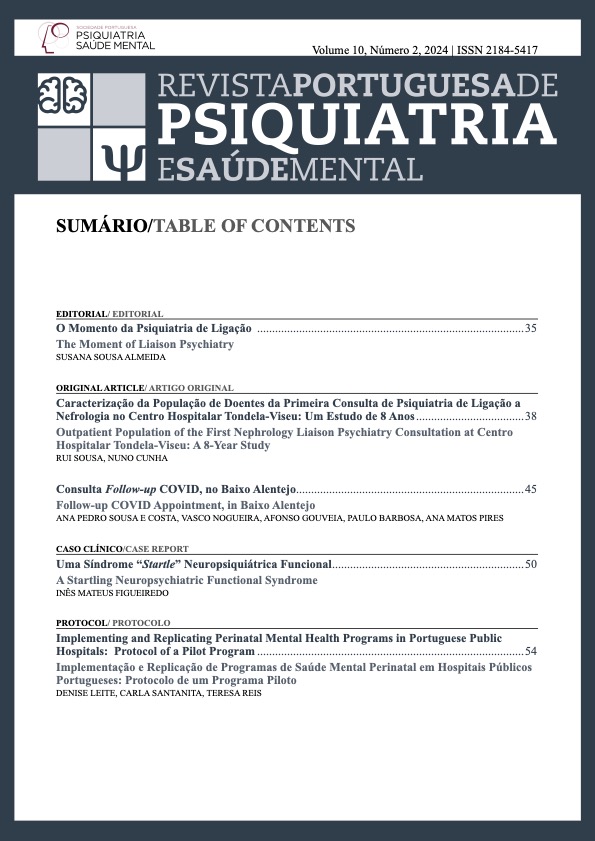Outpatient Population of the First Nephrology Liaison Psychiatry Consultation at Centro Hospitalar Tondela -Viseu: A 8 -Year Study
DOI:
https://doi.org/10.51338/rppsm.456Keywords:
Interdisciplinary Communication, Kidney Failure, Chronic/psychology, Mental Disorders, Referral and ConsultationAbstract
Introduction: The diagnosis of end -stage chronic kidney disease confronts the patient with the need to adjust and acquire coping strategies in the face of the possibility of depending on a dialysis machine for their survival. This period is variable and given the recurrent complications of the chronic kidney disease (CKD), it likely leads to an intermittent and/or chronic adjustment disorder. In this way, our objective is to characterize the outpatient population of the 1st Psychiatry -Nephrology Liaison Consultation at Centro Hospitalar Tondela -Viseu in 8 years.Methods: We consulted all of the Psychiatry -Nephrology Liaison Consultation referrals at Centro Hospitalar Tondela-Viseu from January of 2014 to December of 2021.
Results: One hundred and eighteen patients were referred to the Psychiatry -Nephrology Liaison Consultation at Centro Hospitalar Tondela ‑Viseu from January of 2014 to December of 2021, totaling 547. Growing scientific evidence reports a high prevalence of neuropsychiatric disorders, namely cognitive degeneration, depressive disorders and anxiety disorders in patients with CKD. In the studied population, a high prevalence of adjustment and depressive disorders as well as cognitive decline of multifactorial etiology was observed.
Conclusion: Brain ‑kidney interactions are complex and multifaceted, explaining the significant neuropsychiatric comorbidity observed in patients with CKD. Therefore, there is a clear need of medical and nursing team awareness for distress symptoms and psychiatric disorders in this population, and their subsequent need for liaison referral. This intervention aims to promote disease experience adaptation, while facilitating adherence to treatments and management of secondary effects thereof. We found that the profile of the patient referred to the Psychiatry ‑Nephrology Liaison Consultation at Centro Hospitalar Tondela -Viseu to be the 63 years old male, with end -stage CKD requiring hemodialysis, referred for depressive symptoms, who is diagnosed with a adjustment disorder and medicated with an association of antidepressant and anxiolytic.
Downloads
References
Sensky T. Psychosomatic aspects of end-stage renal failure. Psychother Psychosom. 1993;59:56-68. doi:10.1159/000288649.
Cramond WA, Knight PR, Lawrence JR. The psychiatric contribution to a renal unit undertaking chronic haemodialysis and renal homotransplantation. Br J Psychiatry. 1967;113:1201-12. doi:10.1192/bjp.113.504.1201.
De-Nour AK, Czaczkes JW. Personality factors in chronic hemodialysis patients causing noncompliance with medical regimen. Psychosom Med. 1972;34:333-44. doi:10.1097/00006842-197207000-00007.
Taylor S. Adjustment to threatening events – a theory of cognitive adaptation. Am Psychologist. 1983:1161-73.
Bugnicourt JM, Godefroy O, Chillon JM, Choukroun G, Massy ZA. Cognitive disorders and dementia in CKD: the neglected kidney-brain axis. J Am Soc Nephrol. 2013;24:353-63. doi:10.1681/ASN.2012050536.
Miranda AS, Cordeiro TM, Dos Santos Lacerda Soares TM, Ferreira RN, Simões E Silva AC. Kidney-brain axis inflammatory cross-talk: from bench to bedside. Clin Sci. 2017;131:1093-105. doi:10.1042/CS20160927.
Lee YJ, Kim MS, Cho S, Kim SR. Association of depression and anxiety with reduced quality of life in patients with predialysis chronic kidney disease. Int J Clin Pract. 2013;67:363-8. doi:10.1111/ijcp.12020.
Mogi M, Horiuchi M. Clinical interaction between brain and kidney in small vessel disease. Cardiol Res Pract. 2011:306189. doi:10.4061/2011/306189.
Toyoda K, Ninomiya T. Stroke and cerebrovascular diseases in patients with chronic kidney disease. Lancet Neurol. 2014;13:823-33. doi:10.1016/S1474-4422(14)70026-2.
Lau WL, Huisa BN, Fisher M. The cerebrovascular-chronic kidney disease connection: perspectives and mechanisms. Transl Stroke Res. 2017;8:67-76. doi:10.1007/s12975-016-0499-x.
Sedaghat S, Cremers LG, De Groot M, Hoorn EJ, Hofman A, Van Der Lugt A, et al. Kidney function and microstructural integrity of brain white matter. Neurology. 2015;85:154-61. doi:10.1212/WNL.0000000000001741.
Tamura MK, Pajewski NM, Bryan RN, Weiner DE, Diamond M, Van Buren P, et al. Chronic kidney disease, cerebral blood flow, and white matter volume in hypertensive adults. Neurology. 2016;86:1208-16. doi:10.1212/WNL.0000000000002527.
Lu R, Kiernan MC, Murray A, Rosner MH, Ronco C. Kidney-brain crosstalk in the acute and chronic setting. Nat Rev Nephrol. 2015;11:707-19. doi:10.1038/nrneph.2015.131.
Weng SC, Wu CL, Kor CT, Chiu PF, Wu MJ, Chang CC, et al. Migraine and subsequent chronic kidney disease risk: a nationwide population-based cohort study. BMJ Open. 2017;7:e018483. doi:10.1136/bmjopen-2017-018483.
Wu CL, Kor CT, Chiu PF, Tsai CC, Lian IB, Yang TH, et al. Long-term renal outcomes in patients with traumatic brain injury: a nationwide population-based cohort study. PLoS One. 2017;12:e0171999. doi:10.1371/journal.pone.0171999.
Deng G, Vaziri ND, Jabbari B, Ni Z, Yan XX. Increased tyrosine nitration of the brain in chronic renal insufficiency: reversal by antioxidant therapy and angiotensin-converting enzyme inhibition. J Am Soc Nephrol. 2001;12:1892-9.
Fujisaki K, Tsuruya K, Yamato M, Toyonaga J, Noguchi H, Nakano T, et al. Cerebral oxidative stress induces spatial working memory dysfunction in uremic mice: neuroprotective effect of tempol. Nephrol Dial Transplant. 2014;29:529-38. doi:10.1093/ndt/gft327.
Waraich P, Goldner EM, Somers JM, Hsu L. Prevalence and incidence studies of mood disorders: a systematic review of the literature. Can J Psychiatry. 2004;49:124-38. doi:10.1177/070674370404900208.
Katon WJ. Epidemiology and treatment of depression in patients with chronic medical illness. Dialogues Clin Neurosci. 2011;13:7-23.
Pratt LA, Brody DJ. Depression in the U.S. household population, 2009-2012. NCHS Data Brief. 2014;172:1-8.
Madero M, Gul A, Sarnak MJ. Cognitive function in chronic kidney disease. Semin Dial. 2008;21:29-37. doi:10.1111/j.1525-139X.2007.00384.x.
Tilki HE, Akpolat T, Tunali G, Kara A, Onar MK. Effects of haemodialysis and continuous ambulatory peritoneal dialysis on P300 cognitive potentials in uraemic patients. Ups J Med Sci. 2004;109:43-8. doi:10.3109/2000-1967-109.
Kunschmann R, Busse S, Frodl T, Busse M. Psychotic symptoms associated with poor renal function in mild cognitive impairment and dementias. J Alzheimers Dis. 2017;58:243-52. doi:10.3233/JAD-161306.
Fischer MJ, Xie D, Jordan N, Kop WJ, Krousel-Wood M, Kurella Tamura M, et al. Factors associated with depressive symptoms and use of antidepressant medications among participants in the Chronic Renal Insufficiency Cohort (CRIC) and Hispanic-CRIC Studies. Am J Kidney Dis. 2012;60:27-38. doi:10.1053/j.ajkd.2011.12.033.
Hedayati SS, Yalamanchili V, Finkelstein FO. A practical approach to the treatment of depression in patients with chronic kidney disease and end-stage renal disease. Kidney Int. 2012;81:247-55. doi:10.1038/ki.2011.358.
Nagler EV, Webster AC, Vanholder R, Zoccali C. Antidepressants for depression in stage 3-5 chronic kidney disease: a systematic review of pharmacokinetics, efficacy, and safety with recommendations by European Renal Best Practice (ERBP). Nephrol Dial Transplant. 2012;27:3736-45. doi:10.1093/ndt/gfs295.
Palmer SC, Natale P, Ruospo M, Saglimbene VM, Rabindranath KS, Craig JC, et al. Antidepressants for treating depression in adults with end-stage kidney disease treated with dialysis. Cochrane Database Syst Rev. 2016;2016:CD004541. doi:10.1002/14651858.CD004541.pub3.
Symister P, Friend R. The influence of social support and problematic support on optimism and depression in chronic illness: a prospective study evaluating self-esteem as a mediator. Health Psychol. 2003;22:123-9. doi:10.1037/0278-6133.22.2.123.
Duarte PS, Miyazaki MC, Blay SL, Sesso R. Cognitive-behavioral group therapy is an effective treatment for major depression in hemodialysis patients. Kidney Int. 2009;76:414-21. doi:10.1038/ki.2009.156.
Ouzouni S, Kouidi E, Sioulis A, Grekas D, Deligiannis A. Effects of intradialytic exercise training on health-related quality of life indices in haemodialysis patients. Clin Rehabil. 2009;23:53-63. doi:10.1177/0269215508096760.
Kouidi E, Karagiannis V, Grekas D, Iakovides A, Kaprinis G, Tourkantonis A, et al. Depression, heart rate variability, and exercise training in dialysis patients. Eur J Cardiovasc Prev Rehabil. 2010;17:160-7. doi:10.1097/HJR.0b013e32833188c4.
Kimmel PL. Depression in patients with chronic renal disease: what we know and what we need to know. J Psychosom Res. 2002;5:951-6. doi:10.1016/s0022-3999(02)00310-0.
Chilcot J, Davenport A, Wellsted D, Firth J, Farrington K. An association between depressive symptoms and survival in incident dialysis patients. Nephrol Dial Transplant. 2011;26:1628-34. doi:10.1093/ndt/gfq611.
Lacson E Jr, Li NC, Guerra-Dean S, Lazarus M, Hakim R, Finkelstein FO. Depressive symptoms associate with high mortality risk and dialysis withdrawal in incident hemodialysis patients. Nephrol Dial Transplant. 2012;27:2921-8. doi:10.1093/ndt/gfr778.
Lacson E Jr, Bruce L, Li NC, Mooney A, Maddux FW. Depressive affect and hospitalization risk in incident hemodialysis patients. Clin J Am Soc Nephrol. 2014;9:1713-9. doi:10.2215/CJN.01340214.
Tsai YC, Chiu YW, Hung CC, Hwang SJ, Tsai JC, Wang SL, et al. Association of symptoms of depression with progression of CKD. Am J Kidney Dis. 2012;60:54-61. doi:10.1053/j.ajkd.2012.02.325.
O’lone E, Connors M, Masson P, Wu S, Kelly PJ, Gillespie D, et al. Cognition in people with end-stage kidney disease treated with hemodialysis: a systematic review and meta-analysis. Am J Kidney Dis. 2016;67:925-35. doi:10.1053/j.ajkd.2015.12.028.
Kalirao P, Pederson S, Foley RN, Kolste A, Tupper D, Zaun D, et al. Cognitive impairment in peritoneal dialysis patients. Am J Kidney Dis. 2011;57:612-20. doi:10.1053/j.ajkd.2010.11.026.
Dahbour SS, Wahbeh AM, Hamdan MZ. Mini mental status examination (MMSE) in stable chronic renal failure patients on hemodialysis: the effects of hemodialysis on the MMSE score. Hemodial Int. 2009;13:80-5. doi:10.1111/j.1542-4758.2009.00343.x.
Sorensen EP, Sarnak MJ, Tighiouart H, Scott T, Giang LM, Kirkpatrick B, et al. The kidney disease quality of life cognitive function subscale and cognitive performance in maintenance hemodialysis patients. Am J Kidney Dis. 2012;60:417-26. doi:10.1053/j.ajkd.2011.12.029.
Etgen T, Chonchol M, Forstl H, Sander D. Chronic kidney disease and cognitive impairment: a systematic review and meta-analysis. Am J Nephrol. 2012;35:474-82. doi:10.1159/000338135.
Buoncristiani U, Alberti A, Gubbiotti G, Mazzotta G, Gallai V, Quintaliani G, et al. Better preservation of cognitive faculty in continuous ambulatory peritoneal dialysis. Perit Dial Int.1993;13 Suppl 2:S202-5.
Tian X, Guo X, Xia X, Yu H, Li X, Jiang A. The comparison of cognitive function and risk of dementia in CKD patients under peritoneal dialysis and hemodialysis: a PRISMA-compliant systematic review and meta-analysis. Medicine. 2019;98:e14390. doi:10.1097/MD.0000000000014390.








